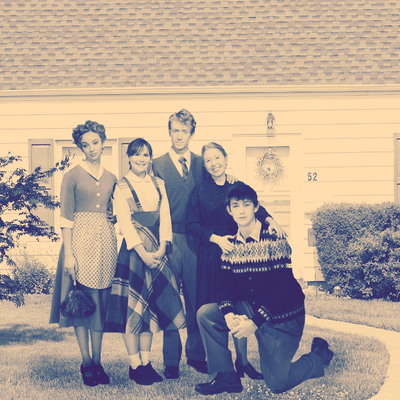University of Michigan's 'The Skin of Our Teeth' presents strange but hopeful view of humanity

"The Skin of Our Teeth"
photo by Peter Smith Photography | courtesy of the University of Michigan
If the news (wars, crime, climate change, politics, etc.) is a regular part of your daily life, you can’t help but occasionally feel like everything’s spiraling out of control, and that we’re beyond help.
But as evidenced in Thornton Wilder’s Pulitzer Prize-winning play “The Skin of Our Teeth,” now being staged by U-M’s department of theatre and drama, this particular brand of human kvetching has been a constant through the ages—ages that mankind has nonetheless survived every time thus far.
With a run time of just over two and a half hours, the first act of “Teeth” shows the Antrobus family in their modern New Jersey home, where a dinosaur and a mammoth are pets; vagrants (including Moses, Homer, and a handful of muses) press to gain entry; a giant, destructive wall of ice is headed their way, making the weather cold, despite its being August; and the father (Ben Blackman) has just invented the wheel and the alphabet, among other things. Mrs. Antrobus (Elly Jarvis) urges her young daughter Gladys (Shannon Eagen) to stop hiking up her skirts, and discourages her son Henry (Robert O’Brien) - who previously, when he was known as Cain, killed his brother Abel - from hurting others.
In act two, set during the 1980s (notice the era-appropriate Madonna lookalike in the ensemble), Mr. Antrobus is the elected President of the Fraternal Order of Mammals, and after he and his wife deliver speeches, the family finds itself on the Jersey Shore, staring down a hurricane and reenacting Noah’s escape from the flood. Finally, the third act begins as a war ends. Mr. Antrobus and Henry have a tense showdown, Gladys has a new baby, and -Â all efforts to exert control over her children having thus failed - Mrs. Antrobus works to put the house back in order.
What’s missing in this synopsis is mention of Sabina (Brittany Uomoleale), the Antrobus’ housekeeper, who’s always jockeying for Mr. Antrobus’ attention and often breaking the fourth wall to address the audience. Uomoleale got some of the biggest laughs on opening night, particularly when cracking wise as the actress playing Sabina, or delivering the Cliff’s Notes version of a scene she must do over, since she knows we’ve already watched it before.
Indeed, Sabina acts as the audience’s doorway into Wilder’s absurd, time-collapsing world, acknowledging regularly that she doesn’t understand what the play’s about and can’t make sense of it. In this way, Wilder reminds us not to overthink the play and take things too seriously; and Uomoleale is one of the production’s greatest assets, giving us someone to connect to while also delivering the goods comedically.
All of the leads generally perform well, and Melissa Golliday, as a fortune teller, is a charismatic standout in act two - despite the fact that this middle section is decidedly the least absorbing of the play's three parts. For while it’s true that Wilder’s speeches often bog down this overly-long play’s pacing, the first act’s novelty and innovation and whimsy inevitably charm you, while the final act’s confrontations, confessions and generational progression keep it (mostly) engaging.
Vincent Mountain’s set, lit by Aaron Tacy, is definitely one of the stars of “Teeth,” making the shift from stylish mod house to garish beachfront to hollowed-out war zone with impressive alacrity. Jessica Hahn’s terrific costumes, paired with Dawn Rivard’s wigs and makeup, are referential and fun - Mrs. Antrobus bears a certain resemblance to Hillary Clinton when she appears as the mammal president’s wife, and Sabina’s appearance calls Lucille Ball to mind at the play’s outset - thus solving the riddle of how to dress people who’re living in different eras simultaneously. And Henry Reynolds designed the show’s sound, which included splicing historical sound bites from across the decades together, so as to underscore the broad range of events and times represented in the show.
Director Jonathan Berry’s passion for the material shines through, and the students seem to be having a great time, too. So although Wilder’s heavy-handed philosophizing can become tiresome in moments, the message that we’ll find our way through our current crises is a balm.
And any play that features a dinosaur and mammoth sitting on a couch - well, you’ve almost got to give it a chance on that basis alone, right?
For background, see the AnnArbor.com preview. For tickets, see the U-M SMTD website.
Jenn McKee is the entertainment digital journalist for AnnArbor.com. Reach her at jennmckee@annarbor.com or 734-623-2546, and follow her on Twitter @jennmckee.


Comments
David
Fri, Feb 22, 2013 : 4:54 p.m.
Why take a perfectly good, thoughtful play and 1)re-write it just for the fun of it, and 2)perform it ham-handedly?